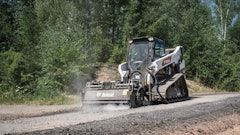The National Center for Asphalt Technology (NCAT) announced the results of a study evaluating the role of ground tire rubber powder in asphalt mixture performance. Debunking a common industry belief, the study indicates that the asphalt manufacturing process, whether cryogenic or ambient, does not impact the performance of the rubber material or, ultimately, the asphalt.
“We are optimistic that the study findings will accelerate the use of sustainable material in highway construction,” said Richard Willis, NCAT’s assistant research professor. “By increasing the use of ground tire rubber, asphalt producers will benefit from price stability as compared to more volatile oil prices which impact the cost of traditional, oil-based polymers. Importantly, ground tire rubber produced cryogenically or ambiently provides high performance and cost benefits in asphalt.”
Ground tire rubber (GTR) can be blended with asphalt to beneficially modify the properties of the asphalt for highway construction. According to the United States Environmental Protection agency, benefits of using tire rubber in asphalt include:
• Longer lasting road surfaces
• Reduced road maintenance
• Cost effectiveness over the long term
• Lower road noise
• Shorter breaking distances
In recent years, as oil prices have risen, the number of states reassessing the potential of GTR mixtures has begun to increase; however, little research has been published which characterizes the influence of particle size, grinding technique and blending methodology.
The NCAT study addressed these needs and indicates that surface area and particle size of the rubbers had the most influence on the modified asphalt binder – smaller particle size, which equates to larger surface area, provides better performance. Based on the study results, researchers also recommend:
• Ground tire rubber should be considered an appropriate asphalt binder modifier to achieve critical high temperature performance in mixtures.
• Ambient and cryogenic GTR performed equally in terms of binder modification and separation. Specifications should not distinguish between the two types of materials when the GTR is 30 mesh or smaller.
• Ten percent rubber is an appropriate level of loading for asphalt binders.
According to the Rubberized Asphalt Foundation (RAF), 70 percent of state transportation agencies, including California, Arizona, Florida, Georgia and Texas, have reaped the financial benefits of using rubber-modified asphalt (RMA) on their highways. The RAF states that rubberized asphalt can save between $2 and $5 per ton compared to conventional polymer-based asphalt. Recently, the Georgia Department of Transportation (GDOT) amended the state’s road construction specifications to include recycled rubber as an alternative to oil derived polymers.
Rubber particulate modification of binders has been performing in the market for over 30 years in various parts of the country, and this research will support the understanding of how to use tire rubber to make performance graded asphalt. The study’s findings, along with phase two work with asphalt mixtures and slight modifications to the Performance Grade specifications, will allow states the means to capture the high performance characteristics of tire rubber in asphalt
systems.
“Ground tire rubber is a product that provides long-term supply and is a costeffective and competitive way to increase the robustness of asphalt, while also serving as a productive outlet for end-of-life tires,” said Peter Wu, P.E., Ph.D. from the Office of Materials and Research at the GDOT. “The department is always looking for ways to provide taxpayers with a greater value and the use of rubber-modified asphalt can do that while also contributing to the state’s sustainability efforts.”
The study was conducted at NCAT’s facility in Auburn, Ala., with the assistance of partners Blacklidge Emulsions, Lehigh Technologies and Liberty Tire Recycling. The full study can be downloaded here.


























